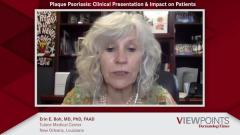
Managing Plaque Psoriasis: Expert Advice
Takeaways from a panel discussion on newer biologic therapies to treat plaque psoriasis, and parting advice to other professionals who work in dermatology regarding best practices when using these drugs in their clinics.
Episodes in this series

Andrew F. Alexis, MD, MPH: The time just flew by. We’re approaching the end of our segment. I’d like to give everybody a chance to share some final thoughts and quick takeaways about any advice you have for community dermatologists, early career dermatologists, or just the general dermatologic community about treating plaque psoriasis. Why don’t we start with Erin Boh?
Erin E. Boh, MD, PhD, FAAD: The 1 word I could say is treat. If you’re a community dermatologist and you’ve got patients, you can send them to the experts. That’s great, but you ought to just start doing it yourself. People do things in their office, and they’re as risky as these. These are so easy to do that dermatologists should be doing them. Make it easy.
Figure a way that will get your office to work for you. Get your prior authorizations. Once you have a patient who you’ve given this medicine to, and they come in and say, “This happened to me the other day,” with 55% body surface area, I put her on 1 of the IL-23s. And 4 weeks later she’s coming in. She brings her husband and she brings her kids because she is so happy. Her exact words are, “You changed my life.” We can all do it. I think we just need to do it. Don’t be afraid.
Andrew F. Alexis, MD, MPH: Great. April?
April W. Armstrong, MD, MPH: I love what Erin said. I want to echo that. The other thing I wanted to say is just get yourself continually educated. Keep learning, because there are a lot of new things, but don’t be afraid to learn them. Sometimes it seems overwhelming and can be a little confusing, but hopefully educational sessions such as this will lend some clarity to our treatment paradigm.
Andrew F. Alexis, MD, MPH: Great. Last word, Andy?
Andrew Blauvelt, MD, MBA: My father had severe psoriasis, so I take this very seriously. He lived through phototherapy, acitretin, cyclosporine, and methotrexate. Unfortunately, he passed away from complications from heart attacks and strokes. He had severe psoriasis most of his life. I firmly believe it contributed to his heart disease. It’s such an opportunity, as Erin mentioned, for us to not only make the patients’ lives turn around in the present time but to make them live longer—to have an impact.
The data are emerging on heart disease and improving heart disease. I really believe that’s where the data are looking and going toward. It’s not just a skin problem. Right? It’s not just a quality-of-life issue. It is an important disease. I think about it as saving lives.
Andrew F. Alexis, MD, MPH: Well said. I just want to take a moment to thank our panelists. What a wonderful group of experts. Thank you for being so generous in sharing your insights and your pearls. I probably speak for many that we could probably talk for another hour and learn so much more from you. Thank you so much, but our time has come to a close. This has really been an excellent discussion. We hope you found the information to be valuable to your clinical practice. Thank you all for taking time to watch this Dermatology Times® View Points program. See you next time.
Newsletter
Like what you’re reading? Subscribe to Dermatology Times for weekly updates on therapies, innovations, and real-world practice tips.























